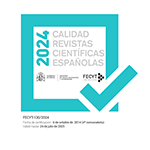La polemica sulla nobiltà nell’Italia del Quattrocento
Abstract
In the year 1440, Poggio Bracciolini wrote his work «De nobilitate», where he asserted that true nobility results only from virtue and not from lineage and old wealth. Moreover, he censured all the real aristocracies of the italian cities, except Florence, and foreign countries. Many very harsh angry replies came from italian cities, which carried on a very heated controversy. Leonardo da Chio (Genoa), Lauro Quirini and Paolo Morosini (Venice), Jacopo di Porcìa (Friuli) and Tristano Caracciolo (naples), although they acknowledged the importance of virtue, it was nobility from lineage and old wealth they defended the most. At the end of the century, Antonio De Ferrariis (Lecce) re-asserted that nobility could result only from virtue.Downloads
Article download
License
In order to support the global exchange of knowledge, the journal Cuadernos de Filología Clásica. Estudios latinos is allowing unrestricted access to its content as from its publication in this electronic edition, and as such it is an open-access journal. The originals published in this journal are the property of the Complutense University of Madrid and any reproduction thereof in full or in part must cite the source. All content is distributed under a Creative Commons Attribution 4.0 use and distribution licence (CC BY 4.0). This circumstance must be expressly stated in these terms where necessary. You can view the summary and the complete legal text of the licence.








